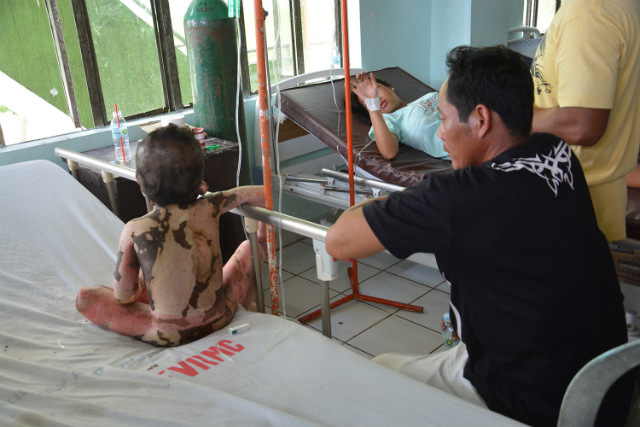SUMMARY
This is AI generated summarization, which may have errors. For context, always refer to the full article.

MANILA, Philippines – International delegates praised the Philippines for its perceived progress after Super Typhoon Yolanda (Haiyan), but a recent tent fire in Tacloban, among other incidents and problems, hounded a key disaster conference that the Philippines is hosting.
The tent fire in Tacloban killed a 35-year-old mother, Maria Eliza Ocenar, and all her 6 children – a tragedy illustrating the fate of thousands who remain homeless after Yolanda.
One diplomat who heard this story is Kristalina Georgieva, the European Union commissioner for international cooperation, humanitarian aid, and crisis response.
“This is horrible,” Georgieva said of the tent fire, as she addressed reporters on Thursday, June 5.
The European commissioner, along with other dignitaries at the Asia Europe Meeting (ASEM) Manila Conference, was asked how to reconcile the so-called progress in Yolanda-hit areas with problems such as the tent fire in Tacloban.
“I also heard about this case. I saw the tent city. I’m thinking back of other disasters of this incredible scale, like Haiti where, even today, there are people who are still displaced. Not to be ever accepted,” Georgieva said in a media conference.
“We must do more to figure out how to help these people. But we have to also place the recovery effort here in this context of the enormity of the problem that Yolanda caused,” she also said.
Georgieva added: “My message to people who are still looking for better days is that, raise your voices, speak up, but also understand the enormity of what has happened. My message to local authorities, to us in the international community, is to continue to persevere with seeking ways to help those that are most forgotten, most in need of this help, as difficult as this might be.”
Philippines’ ‘impressive’ speed
The tent fire incident is a story, among many others, that contextualizes the statements Georgieva made earlier in the media conference.
Georgieva, for one, said “the speed with which help has started flowing across such a vast territory, is impressive.”
“The shift from relief and rehabilitation and recovery – that has been done here in the Philippines quite quickly. I have been to Haiti, to Pakistan, to Japan, many times to countries in Africa affected by disasters, and I can vouch that this shift from relief to rehabilitation, very visibly, has been quite quick,” the EU commissioner added.
Philippine Foreign Secretary Albert del Rosario, for his part, said the government is “working hard to able to sort out these problems.” The situation, however, “is something that must be considered as a process,” as the government looks for land to rebuild houses, for example. (READ: 4,000 hectares identified for Haiyan resettlement)
“I share the grief of the loss of those lives as a result of that fire in a tent, and I just hope that we take all unnecessary precautions so that the same loss is not ever seen again,” he said.
Yolanda a ‘harsh reminder’
Undersecretary Alexander Pama, executive director of the National Disaster Risk Reduction and Management Council, said the government wants to approach Yolanda-related issues “on a holistic basis.”
“While we would want to give immediate solutions to problems and issues such as those, a lot of other concomitant issues are coming up,” Pama said.
Philippine President Benigno Aquino III, in his speech at ASEM earlier on Thursday, stressed the need for countries to work together.
“Haiyan was a harsh reminder: The new normal brought about by climate change is not only here to stay; its effects are worsening at an alarming pace,” Aquino said.
He said his administration has worked toward trying “to climate-proof our path progress,” but the government cannot do it alone.
“The reality of climate change is already significantly altering the way all of us live, and we are now faced with a crucial choice: We can either act collectively now to address the problem, or we can choose to act independently, or not at all, and suffer the aftermath of inaction collectively.” – with a report from Natashya Gutierrez/Rappler.com
Add a comment
How does this make you feel?
![[In This Economy] A counter-rejoinder in the economic charter change debate](https://www.rappler.com/tachyon/2024/04/TL-counter-rejoinder-apr-20-2024.jpg?resize=257%2C257&crop=267px%2C0px%2C720px%2C720px)
![[Vantage Point] Joey Salceda says 8% GDP growth attainable](https://www.rappler.com/tachyon/2024/04/tl-salceda-gdp-growth-04192024.jpg?resize=257%2C257&crop_strategy=attention)
![[ANALYSIS] A new advocacy in race to financial literacy](https://www.rappler.com/tachyon/2024/04/advocacy-race-financial-literacy-April-19-2024.jpg?resize=257%2C257&crop_strategy=attention)


There are no comments yet. Add your comment to start the conversation.